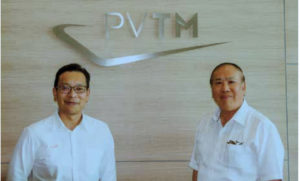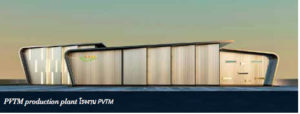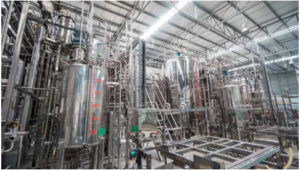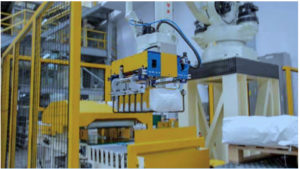PVTM co LtD, a subsidiary of Intelnovation Group, has introduced powder products and ramped up production capacity for liquids to keep up with growing demand for preservatives and feed hygiene products.

(Left) Dr Tanunt and Vasunt Leelayoova
Vasunt Leelayoova, managing director, said that Thailand is in a strong position to become a global manufacturing base for exporting products and technologies by 2020.
Rather than using price as a strategy, PVTM offers customers superior products paired with proprietary applicator technologies designed to fit specific requirements, said Mr Vasunt.
“For over two decades, we have provided the industry with solutions for eradicating salmonella in feed and in the food chain. When it comes to salmonella, we have the solutions,” he said.
PVTM has businesses in 11 countries in Asia where it markets by itself and via distributors, and now it is looking to develop markets in China and other fast growing markets.
Dr Tanunt Leelayoova, technical advisor, said the powdered products were developed to create a new segment, especially on-farm mixing, for small to medium-scale feed producers and off- shore markets.
Nevertheless, its flagship products are liquids which can be applied with a range of liquid applicators. Presently, there are six models offered to suit various specifications.
Its subsidiary PVTE, an engineering design company, has continuously upgraded product development in both hardware and software for over a decade to ensure that the applicators are up-to-date and matched well with customer production systems.
PVTE is appraising the viability of setting up applicator assembly lines offshore to serve customers and agents. Offshore ventures will benefit from the company’s proprietary technology, while local partners will receive training in products and technical services.
Powder products
The company recently completed a plant expansion to produce more powder products. The production line is designed to produce more than 10,000 tonnes/year of combined acid and non-acid products.
Organic acid products are mainly used to combat mold, while non-acid products are used to control feed or food-borne pathogens, such as salmonella and E. coli.

PVTM production plant
The extended powder section is contained in a low-rise building that stands only 13 m high. Even so, it functions similar to a typical high tower by using pneumatic pressure to move the ingredients through pipes.
Ingredients are stored in bins and pneumatically conveyed to the batching scale and mixers where carriers and liquid ingredients are subsequently added through an automated system.
The mixer is made of food-grade stainless steel, batch size 1,000 kg. The mixing system is specifically designed to achieve optimum homogeneity. The products undergo a metal scan to detect tramp iron.
The mixer is thoroughly washed before starting a new formula to minimize carry over risks. The combined capacity of the new powder line is over 10,000 tonnes/year for both acid and non-acid products.
The expansion will be GMP, ISO 9001, HACCP and FAMI-QS audited in March and it is likely that the auditing process will be completed by end of Q1.
For liquid products, PVTM has refined the production processes to improve productivity and cost per unit, said Dr Tanunt.

Liquid production lines
The new plant is fully automatic, operated by less than 10 people, and uses a pallet-stacking robot. Liquid products are available in intermediate bulk container (IBC) tanks and bulk tanks.
The completion of the second phase has enabled PVTM to supply more than 30,000 tonnes/year of both acid and non- acid products.
PVTM’s second phase expansion has received investment privileges from Thailand’s Board of Investment and soft loans from the National Science and Technology Development Agency (NSTDA).
Product wholesomeness
Incoming raw materials are stored in quarantine areas where they are tested to ensure that they meet specifications and are safe to use. Similarly, finished products are tested for contaminants and pass through a metal detector.
Raw materials and finished products are tested for dioxins and PCBs (polychlorinated biphenyls), heavy metals and antibiotic contamination in line with European Union (EU) recommendations.
The products are fully traceable. Test drills are performed on a regular basis. Since 2008, production information has been stored “in the cloud” on an off-site server and can be accessed anytime from anywhere, said Dr Tanunt.

Pallet-stacking robot
Mr Vasunt said Intelnovation is well-equipped to handle technological change and disruptions. It has kept up with new developments in poultry, swine and pet nutrition.
The company has been manufacturing bacteria and mold control products since 2000.
At first, it developed its own product formulas which were toll-manufactured in the US, while applicator systems were developed internally.
The bird flu crisis in 2004, which brought public awareness of feed hygiene to the forefront, was a game changer for the company. Also, in 2010, the company was the first in Thailand to become FAMI-QS accredited.
Intelnovation’s key success factors are “perseverance and dogged determination,” Mr Vasunt concluded.

